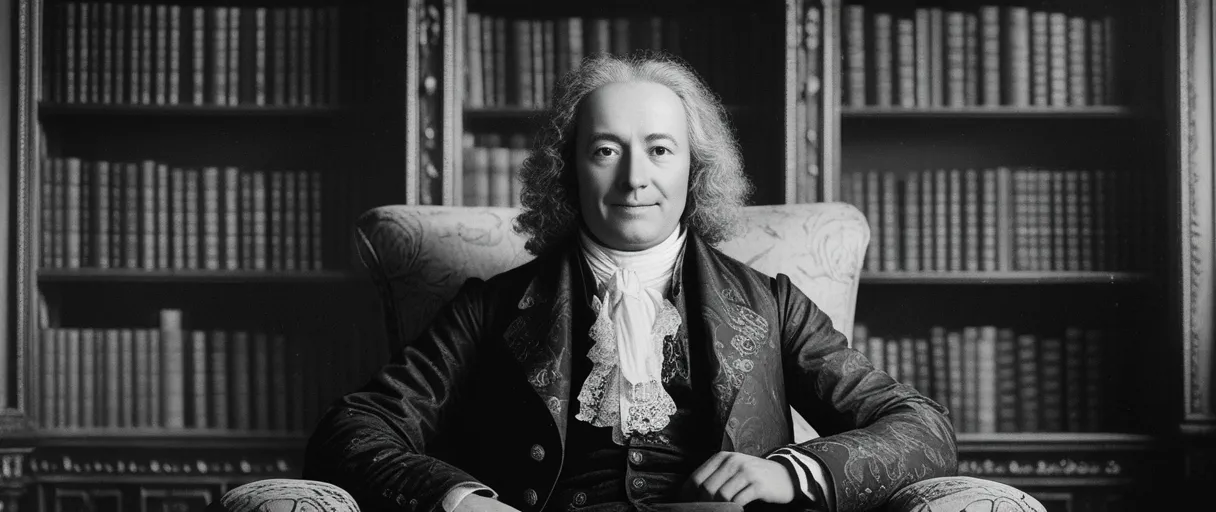
Voltaire
Voltaire was an influential Enlightenment philosopher known for his sharp wit, advocacy for reason, and his satirical masterpiece "Candide," critiquing societal injustice and dogmatic traditions.
Full Name: Voltaire
Born: Paris, Paris, France on November 21st, 1694
Exiled: Temporary Residence, Geneva, Switzerland
Notable Works
Voltaire's literary legacy shines brightest through his satirical masterpiece, "Candide," a work of philosophical fiction that brilliantly critiques optimism and blind faith in philosophical systems. In "Candide," readers follow the titular character, Candide, as he journeys through a series of increasingly absurd misfortunes, humorously highlighting the folly and naivety inherent in the belief that our world is the "best of all possible worlds." Beyond satire, Voltaire's sharp wit and insightful storytelling explore core themes such as the criticism of societal corruption, hypocrisy, and the relentless pursuit of reason and enlightenment. His incisive observations shaped not only literary traditions but also wider cultural and philosophical dialogues, cementing "Candide" as a timeless reflection on human folly and resilience. Through his engaging narratives and memorable characters, Voltaire remains an enduring figure whose works continue to captivate and provoke thoughtful reflection on society and human nature alike.
Books by Voltaire
Overview & Analysis
Voltaire remains one of the Enlightenment's most eminent voices, celebrated for his sharp wit, incisive criticism, and relentless advocacy for reason and individual freedom. His literary efforts, particularly the satirical masterpiece "Candide," vigorously confronted oppressive institutions, dogmatic religious practices, and rigid class structures prevalent in 18th-century European society. Employing humor, irony, and keen observation, Voltaire exposed hypocrisy and injustice, urging readers toward intellectual curiosity, tolerance, and personal integrity. Throughout his prolific career, he consistently championed freedom of thought and expression, warning against unchecked authority and advocating for a society governed by rationalism and humanism. Voltaire's work, often controversial and provocative, sparked important discourse and contributed significantly to shaping modern Western thought. His fearless commitment to challenging societal norms and promoting individual moral judgment has cemented his enduring legacy, influencing generations of thinkers and writers who followed in his footsteps.
Back to TopInfluences & Worldview
Voltaire stands as one of the most influential philosophical thinkers of the Enlightenment Era, renowned for his sharp wit, incisive social commentary, and relentless pursuit of reason and individual freedom. Through his celebrated satire, "Candide," he masterfully critiqued institutionalized religion, oppressive societal norms, and rigid class structures, often employing humor and irony to expose hypocrisy and injustice. A steadfast advocate for freedom of thought and personal integrity, Voltaire consistently challenged authoritarian governance and was wary of unchecked power in any form. His writings reflect a deep commitment to the value of individual moral judgment, tolerance, and intellectual curiosity over blind conformity to tradition or authority. Though often controversial, his courageous stance against intolerance and dogmatism has left a lasting legacy, cementing him as a beacon of rational humanism and social critique whose ideas continue to resonate profoundly in modern discourse.
Relevant Historical Events
- Rise of Scientific Rationalism (1700 – 1900): An intellectual movement emphasizing reason, scientific method, and empirical evidence as the primary sources of knowledge, challenging traditional religious and superstitious beliefs.
- Lisbon Earthquake of 1755 (1755): A devastating earthquake, followed by a tsunami and widespread fires, destroyed much of Lisbon, causing massive loss of life and property. The disaster had profound philosophical and theological implications across Europe.
- Seven Years' War (1756 – 1763): A widespread global conflict involving major European powers, fought across five continents over colonial territories, trade dominance, and political supremacy. The war reshaped political and colonial boundaries.
Notable Characters
Voltaire's literary works often feature characters who embody satirical critiques of society, religion, and philosophical ideas. Candide, the protagonist of his famous novella "Candide," is a naive and optimistic young man whose experiences brutally dismantle his idealistic worldview, highlighting Voltaire's skepticism toward philosophical optimism and the notion that the world is "the best of all possible worlds." Alongside Candide, the character Dr. Pangloss stands out as a satirical representation of blind optimism and philosophical stubbornness, humorously maintaining his optimistic beliefs despite overwhelming evidence to the contrary.
Another memorable figure is Martin, a deeply pessimistic scholar who contrasts starkly with Pangloss, emphasizing Voltaire's exploration of human nature and the extremes of philosophical thought. Voltaire's characters frequently personify his Enlightenment-era criticisms, utilizing wit and irony to challenge prevailing religious dogmas, social injustice, and institutional hypocrisy. Through these vivid characterizations, Voltaire reflects his own worldview shaped by the intellectual skepticism and rational inquiry characteristic of his time.
Back to TopThemes of Focus
Voltaire consistently explores themes of philosophical skepticism, satirical criticism of society, and the pursuit of reason over dogma. Through his sharp wit and biting satire, he challenges established institutions such as religion, government, and social hierarchies, highlighting their absurdities and hypocrisies. Another primary theme is the critique of optimism, notably in "Candide," where he questions the prevalent philosophical belief that humanity lives in the best possible world.
Secondary themes such as freedom of expression and tolerance reinforce Voltaire’s advocacy for enlightenment values. His fervent defense of individual liberty and rational inquiry reflects the broader Enlightenment worldview, shaped by a historical period marked by intellectual upheaval and skepticism toward traditional authorities. Collectively, these themes underscore Voltaire’s lasting influence as a thinker who sought to illuminate society's flaws and champion progressive ideals.
Back to TopLegacy & Impact
Voltaire's profound influence on literature, philosophy, and society is indisputable, solidifying his place as a cornerstone figure of the Enlightenment. His sharp wit and incisive satire, most notably exemplified in the enduring classic "Candide," have significantly shaped literary traditions, inspiring generations of writers to utilize humor and critical examination of societal norms. Voltaire's relentless advocacy for freedom of thought, criticism of institutionalized religion, and opposition to authoritarian governance profoundly impacted sociopolitical discourse, influencing democratic ideals and human rights movements.
The themes explored in his works, such as individual freedom, tolerance, and skepticism towards blind allegiance to authority, remain strikingly relevant today. "Candide" continues to be studied extensively in educational curricula worldwide, serving as a crucial text for examining philosophical inquiry, critical thinking, and social critique. His characters and narratives have transcended their historical context, adapted into numerous stage productions, films, and academic studies, maintaining a vibrant presence in contemporary culture.
Despite occasional controversies surrounding his outspoken criticisms, Voltaire's legacy endures robustly, celebrated for championing reason, intellectual freedom, and the moral courage to challenge injustice and dogmatic thinking.
Back to TopConclusion
Voltaire's incisive wit and courageous advocacy for reason and personal freedom continue to resonate deeply in modern discourse, underscoring the enduring relevance of his work. His sharp critiques of institutionalized religion, oppressive societal norms, and rigid class distinctions not only shaped literary traditions, but also laid a foundation for critical thinking and social analysis that remains profoundly influential today.
By employing satire and humor to expose hypocrisy and injustice, Voltaire challenged readers to question authority, embrace intellectual curiosity, and value individual moral judgment over blind conformity. As contemporary society grapples with similar themes of intolerance, dogmatism, and power imbalances, Voltaire's narratives offer timeless insights and inspiration. Readers today will find in his vibrant stories both a mirror reflecting ongoing societal struggles and a call to uphold the principles of rational humanism, integrity, and tolerance that continue to guide meaningful progress.
Back to Top